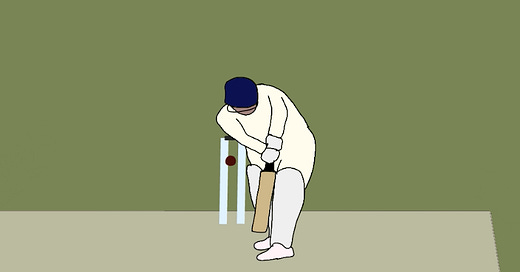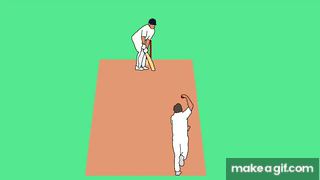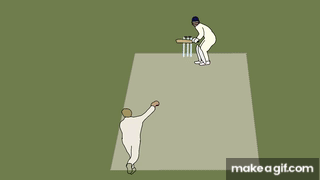Three balls of magic: the Shane Warne surprise
Gatt, Richie and Strauss. Just three of 51,347 times he caught us unaware.
The Strauss ball in '05 came more than a decade after the Gatting ball, and the magic was known.
Strauss had faced Warne, seen Warne, knew everything he could about Warne. It was fucken Shane Warne, right. Strauss' wife was a fellow Victorian as well, he basically married into Warne. Strauss would have known everything, the drugs, bookie, the Ashes, World Cups, affairs and the wickets. You couldn't have watched cricket - let alone played it - and not been an expert in Shane Keith Warne.
And Strauss was facing him in the middle of perhaps Warne's most iconic series. Where Warne decided to not allow Australia to lose an Ashes. Strauss had faced him, knew him, and grew up watching him. Every England team meeting would have been about him. They invented a robot to try mimic him. By this point, everyone had virtually invented cameras to unpack the mystery. To decode Warne's magic. To slow it down so much a child could work it out. And yet in this one moment, Strauss is standing there absolutely stunned at what Warne had done to him. His foot is near silly point, and his leg stump has been rumbled. But most of all, Strauss looked shocked.
Warne maintained mystery in the harshest public light.
There are many great balls. The Basit Ali show stopper, the hat trick to Devon Malcolm, Herschelle Gibbs' ripper, a VVS stunner, another one to Strauss, the Kallis 300, Shiv being cut in two, it goes on and on. Balls that gripped, drifted, slid, bounced, or just plain fucked you up. But I want to focus on just three.
Before the Gatting ball there was the one to Richie Richardson.
Not all players get to be remembered as legends, but there was a time when chances are if you loved cricket, Richie Richardson was your favourite player. He hooked the fastest bowlers in the world off his floppy maroon hat. Just as Viv Richards was on his way out, Richie seemed to turn up and tell everyone it would be just fine. Technically flawless, aesthetically pleasing, ego batting. Of course the hat helped in all this.
In Melbourne, Boxing Day 1992, he had a tough gig; Australia set the West Indies 359 on what was known to be a near-impossible fourth innings wicket.
Boxing Day Test is now a famous thing in the world of cricket. But it wasn't in 1992. In 1989 there was no Boxing Day Test. In 1988 and 1984, the Test started before Boxing Day. Until the 80s, it was actually more well known for big shield matches, sometimes there as a Boxing Day Test, but Melbourne had more New Year's Tests than post-Christmas matches.
But sometime in the 90s they became not just automatic, but the most important thing in the cricket world. And you can track that back to Richie Richardson in his beautiful hat.
If Richardson and his wide brim were iconic at that point, Warne was not.
He had four wickets in as many Tests coming in. If he was known for anything, it was either Ravi Shastri and Sachin Tendulkar destroying him, or a brief moment of carnage in that dark of the SSC that ended Sri Lanka. He had a bowling average of 96, looked un-athletic, had blonde highlights and took one wicket in the first innings of Curtly Ambrose.
In this chase, Merv Hughes had taken Desmond Haynes early, and then Phil Simmons scored a hundred as Richardson passed 50 with him. With a lot of quality batters to come, this looked like a potential West Indies victory.
Then Warne delivered a half-tracker. Well it was short, and it certainly wasn't a length that would have worried any player of Richardson's class from a spinner. He went back, and the ball never rose. And it did it at pace.
Richardson's hat stayed majestic, but his stumps were rattled. The new torchbearer of the unbeatable West Indian side was on his way. It would not have been more dramatic if Warne had entered followed by a rousing Ennio Morricone score, a tumbleweed and a local whispering there's a new sheriff in town.
The ball had kept low, but not because of the MCG pitch, but because Warne had bowled a delivery that was not even in modern cricket's vocabulary. The commentators just assumed at first the ball had skidded on its own. However, the ball had been snapped out of his hand with backspin, like he was clicking his fingers and magic came out. The West Indies did not win that Test.
Shane Warne brought back legspin. He brought back flippers. He changed cricket's language. He lit up Boxing Day. And cricket had its first rockstar spinner.
It's all so unlikely, had Warne been taller or faster, he would have been an Australian rules footballer. He got all the way to the professional level before getting shafted.
And then there was the fact that he had dragged himself around by his arms when he had a leg condition as a child. That allowed him to build up his shoulder and wrist strength more than anyone in a gym could. That was the physicality that made him a player that you couldn't copy.
Then his mind. There were actually two legs spinners in Victorian cricket in the early 90s. Shane Warne and Craig Howard. According to Warne, Howard was more talented than him. He was often generous - even overly so - in his praise. Howard didn't have Warne's physicality, but he had a better wrong'un, and bowled a bit more like a taller version of Rashid Khan.
I asked Howard why Warne made it and he didn't. He didn't talk technique or body, he went straight to the mind. Howard said that he couldn't help but show it when he bowled a poor ball. When Warne so very occasionally erred, he would make the batter think he was stepping into a trap.
Warne used legspin like it was fast bowling. 'You hit me, and I'll rattle you next ball'. He would, because he believed he would, and he was a physical freak. Warne seemed to have all the aggression and confidence of the biggest scariest quick and the skill of the wiliest silky spinner.
And that takes us back to that Strauss ball. At Edgbaston, with his team well behind, and some footholes, he was upset, and as usual he was about to take it out on an English victim. He was coming around the wicket to the left-handed Strauss to rip a ball from the rough outside off stump.
Well outside. So outside that there is no reason to fear this ball, or in the case of Strauss, play it. It was perhaps a metre outside off stump, and if not that, then it was definitely a metre from leg. And it moved so quickly. It was like the ball had a personal grudge with Strauss and it was determined to embarrass him. It was a perfect magic trick, there was a puff of dust, then something happened behind Strauss as he was tricked into looking for something else.
But to tell the story of the Strauss ball you really have to go back to Mike Gatting.
When Shane Warne came on to bowl his first ball of Ashes cricket back in 1993, Gatting was the batter. Australia had been clever with Warne in the lead-up. He'd hidden his flipper from Graeme Hick in a warm-up match, and had bowled within himself. England would have known about his seven-wicket haul at the MCG, but they would probably not have studied him close. Since Richie Benaud, leg spinners hadn't been a major part of the ashes. And he was now in the commentary box.
"He'll bowl to an orthodox field for a start. There's a slip. A short cover. Three other men on the offside saving a single. Three on the on and deep backward square," he says. Warne is marking out his run in his long sleeve shirt. It's decently buttoned up. He has zinc on the end of his nose and his bottom lip. There is a big hop at the end as he scratches his run in the turf and he then runs off to find the bowler's marker where Brendan Julian has left it. It is up near the pile of sawdust the bowlers use for footmarks on damp days.
Gatting is tending to the wicket just about where he thinks Warne will pitch it, around leg stump on a good length. Ian Healy is shadow keeping to an imaginary ball. Gatting looks at the field. Warne bowls a couple of looseners out to mid-on. The crowd is having some fun at Old Trafford, chanting something at someone. Allan Border moves deep backward square just a little bit finer.
"First Ball in Test Cricket in England for Shane Warne", says Richie. Gatting is batting with his toes outside leg stump, and an open stance, ready for a big spinning legbreak. Before Warne sets off, there is a slight hesitation, then five normal walking steps, followed by three quicker ones, a small leap and then a legbreak.
Right up until now, this has just been a normal delivery. Richie Benaud has not hyped the situation up. Mike Gatting is not afraid. There is no sense of impending doom from the England fans. They don't know who this blonde kid is. There is no sense that this man is about to define a cricket rivalry for 14 years. That a new bogeyman is seconds from being unleashed. This is just another day in Test cricket. June 4, 1993.
The ball does something odd after it leaves Warne's hand. Before it lands, it starts to drift towards his pads, that's fairly normal, but then it veers violently down the leg side. Like one side of the ball has suddenly become heavier than the other. Now instead of landing around middle and leg, it's way outside.
Gatting has seen it all before. He's captained his team, he's been blamed for losing a World Cup with a reverse sweep, he's been abused for going on a rebel tour to South Africa and he has faced well over 35,000 balls in his career as a pro. He knows that Warne can spin it, so he opens up his stance, and gives himself room. He sees it drift, even further than normal, and his bat is drawn to the ball, but he never overcommits, he is in control of what he is doing.
Gatting played legpsin before. Many times. Gatting murders spinners they have always said. His only hundred against Pakistan was when Abdul Qadir bowled at him. His double century was in Chennai against local leg spinner Laxman Sivaramakrishnan.
Gatting has done a perfectly reasonable shot from a Test cricketer on the first day of a Test in England.
It's the ball that doesn't play fair. It's the ball that reacts weird. It's the ball that rewrites cricket. The ball lands a foot outside leg stump. The ball then hits the outside of off.
The ball.
"And he's done it. He's started off with the most beautiful delivery," adds Richie. Healy and Mark Taylor leap in this creepy unison, like they had this choreographed. They run to Warne, who has a fist clenched near his face in celebration. Graham Gooch is stone-faced behind them. Dickie Bird is shivering like he's just seen a ghost.
Gatting stares down the wicket for the longest time, trying to work out what has just happened. When he leaves the crease, he looks back over his shoulder a couple of times, perhaps to Gooch, and gives his best 'I don't get it face' and shrugs his way off. "Gatting has absolutely no idea what has happened to it." Benaud pauses. "He still doesn't know".
That ball. The ball of the century. The ball of a millennium.
Balls like this didn't exist before. Leg spinners could rip the ball, but not with this drift, this control, this energy. It was like watching something we had never seen before.
The truth is, Shane Warne isn't really found in the highlights. The real skill wasn't the videos going viral now, it was in the hunt. Each batter was an individual case; would he use words, rip, the field, bounce, deception, drama, or his own boyish confidence to defeat them. You couldn't look away, because as much as it was a technique with skills, it was an entertainer putting on a show. The real Shane Warne lived in the dot balls. It was the Gatting, Basit, Gibbs, Shiv, balls that stopped us from breathing. But every Warne ball was something to behold; he captivated cricket 51,347 times.
Shane Warne changed our sport, and when the game evolved, he became something else. By the end of his career, umpires had worked out LBWs, and so he became king of the straight one. Had cricket changed their laws to ensure that they bowled with an orange, he would have found a way to dominate with that. They said he could spin it on ice, I think he could take wickets in zero gravity.
You weren't facing a bowler, you were facing a force of nature.
Now, Andrew Strauss, how many times would he have seen this Gatting ball? His entire life would have been filled with Warne highlights. And 12 years on, so many balls, so many replays, so many highlight packages, so much practice, so much analysis, and yet, the same thing happened to Strauss. The ball pitches in one place, way wide of him and he tries to cover his off stump, because how else could a ball that wide hurt him. No umpire is going to give this out, he's pitched it as a one day wide after all. As long as Strauss protects the off stump he is fine.
But he's not facing a normal bowler, and this isn't a regular delivery. The angle of this is unlike what you face from anyone else. It's like the ball is being delivered from cover. And it goes in front of Strauss' legs and hits the stumps behind his back.
If you pause at the moment he is bowled, he is not just playing the wrong shot, but it appears like he's playing an entirely different sport.
And it's not just that it was another bowled that came from somewhere it shouldn't. Strauss has the same look of confusion of what just happened as Gatting did. As hundreds of them did.
England's robot to imitate Warne was called Merlyn. And yet obviously, it carried none of his magic. By this point he had faced and seen Warne, and knew everything he could, and he was still shocked when it happened to him.
The most known man in cricket just pulled a magic trick after 13 years of every move he made being watched.
Shine all the lights on Shane Warne, watch him in your most ultra HD, slow him down to 500 frames a second, reverse the camera from the front and dissect every part of him with your team of experts. No bowler had ever been opened up like this for the entire world to see. Modern cricket broadcasts expanded to highlight him. We all saw it every time we watched him bowl.
There it is, Mr batter, the magic, right there, we will slow it down so you can see every part of his sleight of hand. TV wrote a manual on Shane Warne, and he exploded it in a puff of dust outside off stump.
Those poor batters. They had absolutely no idea what happened to them.
They still don't know.








